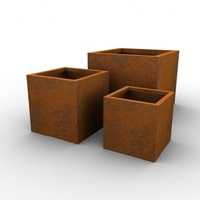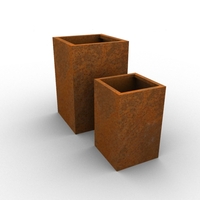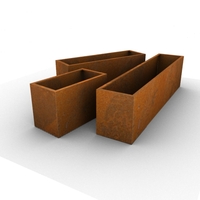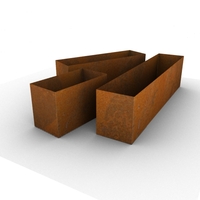Steel Planters and Pots
Steel is a really great material for planters and plant containers: steel is immensely strong; steel is totally frost proof; steel is beautiful; gardens need more warm colours.
Corten steel develops a rusty coat which protects against further corrosion. Mild steel will rust away in time - with the length of time depending on weather conditions. For example: 14 guage steel is 2.108mm thick and, in a garden, can be expected to rust at a rate of about .03 mm/year, which would give the garden planter a lifetime similar to that of a man: 70 years ('three score ten'). Rust is very beautiful and forms a better background than most other materials against which to admire the beauty of leaves, flowers and seed heads in gardens
-
£174.99
with Free Delivery
-
£201.99
with Free Delivery
-
£165.99
with Free Delivery
-
£165.99
with Free Delivery
We love iron and steel in gardens, so please enquire if you are looking for a special item. The advantages of steel for garden planters:
- steel has immense tensile strength and takes up little of your valuable space
- rectangular steel planters fit together to create walls, barriers and other compositions
- steel creates different visual effects, depending on how is treated: stainless steel, galvanised steel, painted steel and rusted steel are all beautiful and harmonise beautifully with flowers, foliage, bark and other materials
- steel is utterly frost-resistant
Will steel rust?
Rusting depends on the type of steel and how it is treated:
Corten steel garden planters
Corten steel (also called Weathering Steel) is a special steel which, after developing a thin coat of rust, is then so rust-resistant that it is used by engineers for underwater construction. We think Corten is a terrific material for use in gardens. It has a superb reddish-brown rusty colour which sets off the shapes and colours of flowers and leaves - as the photographs show.
Stainless steel garden planters
Stainless steel does not rust and can retain a high glass-like polish. But there are different grades of stainless steel and not all of them are equally durable. Stainless steel is brilliantly reflective and therefore very well suited to creating a focal point in a garden. We particularly recommend stainless steel for water features, sundials and ornaments.
Take a look at our Stainless Steel Planters.
Galvanised steel garden planters
Galvanised steel is protected by a zinc coat and will last for a very long time, like a watering can, if the zinc coat is undamaged. It has a soft grey colour, not so different from the cast lead which our ancestors used for garden tanks and garden statues.
Mild steel garden planters
Mild steel, also known as ‘ordinary steel’, does rust but looks beautiful as the rusting proceeds. Like timber, it develops a patina. Its lifetime depends on weather conditions. For example: 14 guage steel is 2.108mm thick and, in a garden, can be expected to rust at a rate of about .03 mm/year, which would give the garden planter a lifetime similar to that of a man: 70 years ('three score ten').
Note: Iron (Fe) is the basic chemical component of steel. In gardens it is used as cast iron, which tends to be heavy, brittle, beautiful and fairly slow to rust.







